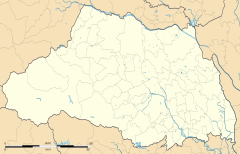Dokkyodaigakumae Station
TS17 Dokkyodaigakumae Station (Soka-Matsubara) 獨協大学前駅〈草加松原〉 | |||||||||||
|---|---|---|---|---|---|---|---|---|---|---|---|
 The east side of Dokkyodaigakumae Station in May 2017 | |||||||||||
| General information | |||||||||||
| Location | 1-1-1 Matsubara, Sōka-shi, Saitama-ken 340-0041 Japan | ||||||||||
| Coordinates | 35°50′37″N 139°48′03″E / 35.8435°N 139.8007°E | ||||||||||
| Operated by | |||||||||||
| Line(s) | TS Tōbu Skytree Line | ||||||||||
| Distance | 19.2 km from Asakusa | ||||||||||
| Platforms | 1 island platform | ||||||||||
| Tracks | 4 | ||||||||||
| Construction | |||||||||||
| Structure type | Elevated | ||||||||||
| Other information | |||||||||||
| Station code | TS-17 | ||||||||||
| Website | Official website | ||||||||||
| History | |||||||||||
| Opened | 1 December 1962 | ||||||||||
| Rebuilt | 1992 | ||||||||||
| Previous names | Matsubaradanchi (until 31 March 2017) | ||||||||||
| Passengers | |||||||||||
| FY2019 | 59,443 daily | ||||||||||
| Services | |||||||||||
| |||||||||||
| |||||||||||
Dokkyodaigakumae Station (Soka-Matsubara) (獨協大学前駅 〈草加松原〉, Dokkyōdaigakumae-eki (Sōka-Matsubara), lit. "in front of Dokkyo University") is a passenger railway station located in the city of Sōka, Saitama, Japan, operated by the private railway operator Tōbu Railway. Opened in 1962, the station was formerly known as Matsubaradanchi Station until it was renamed in April 2017.
Track layout | ||||||||||||||||||||||||||||||||||||||||||||||||||||||||
|---|---|---|---|---|---|---|---|---|---|---|---|---|---|---|---|---|---|---|---|---|---|---|---|---|---|---|---|---|---|---|---|---|---|---|---|---|---|---|---|---|---|---|---|---|---|---|---|---|---|---|---|---|---|---|---|---|
| ||||||||||||||||||||||||||||||||||||||||||||||||||||||||
Lines
[edit]Dokkyodaigakumae Station is served by the Tōbu Skytree Line, and is 19.2 kilometers from the terminus of the line at Asakusa Station in Tokyo.[1]
Station layout
[edit]The station has one elevated island platform with two tracks. The station building is located underneath the platforms. There are two additional tracks for non-stop trains to bypass this station.
Platforms
[edit]| 1 | TS Tōbu Skytree Line | for Kita-Senju, Hikifune, and Asakusa |
| 2 | TS Tōbu Skytree Line | for Kita-Koshigaya, Kasukabe, and Tōbu-Dōbutsu-Kōen |
-
The west entrance in December 2017
-
The platform in December 2022
-
The station sign in June 2017, following renaming
History
[edit]The station opened on 1 December 1962 named Matsubaradanchi Station (松原団地駅).[1] It was rebuilt as an elevated station in 1992.[1]
From 17 March 2012, station numbering was introduced on all Tōbu lines, with Matsubaradanchi Station becoming "TS-17".[2]
On 1 April 2017, the station was renamed "Dokkyodaigaku-mae (Soka-Matsubara)" to reflect its closeness to Dokkyo University and also the Soka Matsubara Walking Trail.[3][4]
-
The west entrance in September 2012, before renaming
-
The east entrance in May 2008, before renaming
-
A platform sign in July 2016, before renaming
Passenger statistics
[edit]In fiscal 2019, the station was used by an average of 59,443 passengers daily.[5]
Surrounding area
[edit]- Sōka Matsubara Housing Estate
- Dokkyo University
- Matsubaradanchi Post Office
- Saiyu Soka Hospital
See also
[edit]References
[edit]- ^ a b c Terada, Hirokazu (19 January 2013). データブック日本の私鉄 [Databook: Japan's Private Railways] (in Japanese). Japan: Neko Publishing. p. 222. ISBN 978-4-7770-1336-4.
- ^ 「東武スカイツリーライン」誕生! あわせて駅ナンバリングを導入し、よりわかりやすくご案内します [Tobu Sky Tree Line created! Station numbering to be introduced at same time] (PDF). Tobu News (in Japanese). Tobu Railway. 9 February 2012. Archived from the original (pdf) on 8 August 2012. Retrieved 27 May 2012.
- ^ 東武鉄道が駅名改称、松原団地を「獨協大学前」に [Tobu Railway renames Matsubaradanchi Station "Dokkyodaigaku-mae"] (in Japanese). Japan: The Saitama Shimbun. 2 April 2017. Archived from the original on 3 April 2017. Retrieved 3 April 2017.
- ^ さよなら「松原団地」駅 団地と歩んだ半世紀、来春改名 [Farewell to Matsubaradanchi Station - to be renamed next spring]. Asahi Shimbun Digital (in Japanese). Japan: The Asahi Shimbun Company. 23 June 2016. Archived from the original on 23 June 2016. Retrieved 23 June 2016.
- ^ 駅情報(乗降人員) [Station information: Passenger figures] (in Japanese). Japan: Tobu Railway. 2021. Retrieved 5 January 2021.
External links
[edit]![]() Media related to Dokkyodaigakumae Station at Wikimedia Commons
Media related to Dokkyodaigakumae Station at Wikimedia Commons
- Official website (in Japanese)








